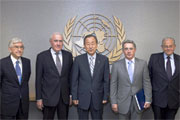(updates)UNITED NATIONS - Secretary-General Ban Ki-moon denied the Israeli military was off limits in a U.N. inquiry into the deadly Israeli commando raid on a Turkish-led aid flotilla heading for Gaza. Israel disputes this and no one is sure what the panel's job description is.
Few expected that the soldiers would be questioned by the U.N. panel, which includes Israeli and Turkish envoys and has a mandate no one has seen. But not content to let sleeping dogs lie, Israeli Prime Minister Benjamin Netanyahu's office immediately fired back saying that "Israel will not co-operate with and will not take part in any panel that seeks to interrogate Israeli soldiers," a statement bound to anger Turkey.
This was hours on Monday after the Israeli leader suggested to a civilian commission in Jerusalem, whose report will go to the U.N. panel, that Turkey wanted a high-profile confrontation and therefore ignored Israeli requests that it stop the flotilla, the New York Times reported. The panel had hoped to patch up Israeli-Turkish relations. Oy vey!
But despite the rhetoric, the four-member U.N. panel met on Tuesday for the first time to plan its work and expects a first report in mid-September.
Eight Turks and an American-Turkish dual national were killed aboard a Turkish ship, the Mavi Marmara, when Israeli naval commandos raided the vessel, part of a six-vessel flotilla, on May 31 in international waters. The action was to stop the ship from its goal of breaching Israel's naval blockade of Gaza, the Palestinian enclave controlled by the militant group Hamas.
The flotilla, meant to deliver supplies to 1.5 million Palestinians, led to a deterioration of Israeli-Turkish relations and forced Israel to ease a blockade of Gaza, which it says it installed to prevent Hamas from acquiring weapons and firing them across the border.
The U.N. Security Council ordered an investigation. The secretary-general last week announced the formation of a panel to be headed by the former New Zealand prime minister, Geoffrey Palmer, and the departing Columbia president, Alvaro Uribe, as his deputy along with veteran Israeli and Turkish diplomats, Joseph Ciechanover and Özdem Sanberk, respectively. (Human rights groups and Spanish journalists have questioned Uribe's inclusion because of his dubious human rights record)
On Monday, Ban Ki-moon, at his monthly press conference, was asked several times whether there was a deal to exclude questioning anyone from the Israeli military, presumably in order to get the Israeli government to agree to the probe. He replied:
"No, there was no such agreement behind the scenes. First of all, you should know that this is an unprecedented Panel of Inquiry established under my initiative, for the purpose of ensuring accountability, which is very important. ....Their main work will be to review and examine the report of the domestic investigations, and liaise with the domestic authorities. And whatever is needed beyond that, they will have to discuss among themselves, in close coordination with the national Government authorities, that they can take their own future steps."
So what is the panel to do? A review or an investigation? The work rules appear to lack the ability to compare conflicting statements from those on the scene. The panel is expected to make recommendations on the use of force and attempt to ease relations between Israel and Turkey, which has demanded compensation to the wounded and the families of the dead and an apology before resuming normal ties with Israel.
On Tuesday, following all the queries, Ban's office spelled out the limitations in a statement:
"The Panel is not designed to determine individual criminal responsibility, but to examine and identify the facts, circumstances and the context of the incident, as well as to recommend ways of avoiding future incidents. For that purpose, the Panel will receive and review reports of national investigations into the incident and request such clarifications and information as it may require from relevant national authorities. The Secretary-General expressed the hope that this Inquiry would also make a positive contribution to the broader peace process, and more specifically to improving relations between Turkey and Israel."
Video footage appeared to show activists on the Turkish ship using clubs and knives and the Israeli soldiers responding with repeated gunfire. Defense Minister Ehud Barak faces criticism over what many in Israel called a botched operation, saying the flotilla could have been stopped another way. (But most polled by the Maariv newspaper rejected calls for him to resign.)
Susan Rice, the U.S. ambassador to the United Nations, gave the panel's mandate a narrow interpretation, thereby infuriating Turkey, which said her analysis would limit the probe. Her comments prompted Turkish officials to reprimand the American charge d'affaires in Ankara.
But she appears to have been correct when she said:
"This panel is not a substitute for those national investigations. The focus of the panel is appropriately on the future and on preventing such incidents from recurring. The United States also hopes that the panel can serve as a vehicle to enable Israel and Turkey to move beyond the recent strains in their relationship and repair their strong historic ties."
 Flotilla panel with UN secretary-general: Özdem Sanberk of Turkey, Geoffrey Palmer of New Zealand, Ban Ki-Moon, Alvaro Uribe of Columbia and Joseph Ciechanover of Israel. UN photo
Flotilla panel with UN secretary-general: Özdem Sanberk of Turkey, Geoffrey Palmer of New Zealand, Ban Ki-Moon, Alvaro Uribe of Columbia and Joseph Ciechanover of Israel. UN photo
